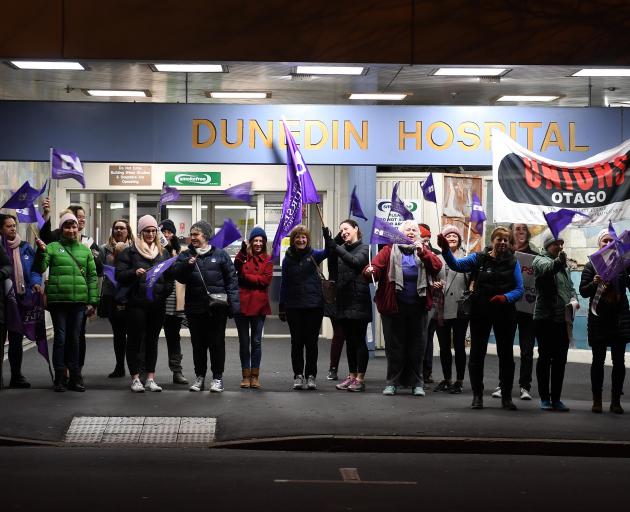A noisy picket line greeted visitors to Dunedin Hospital today, as nurses kicked off 24 hours of strike action.
New Zealand Nurses Organisation members nationwide are on a day-long strike after talks to settle their collective employment agreement broke down.
Nurses, midwives and health assistants walked off the job at 7am, leaving a skeleton team on duty to handle emergencies and maintain life preserving services.
NZNO local organiser Lorraine Lobb said she was pleased with the turnout, and especially pleased that many nurses had been outside Dunedin hospital at the start of the strike to greet colleagues coming off shift.
“Everyone is disappointed that it has come to this, but there are plenty of nurses out here who want to have their say.”
A series of pickets and protest marches are planned for throughout the day.
Talks between the NZNO and district health boards reached an impasse yesterday with a final offer to settle the dispute being rejected.
Nurses are demanding better pay rates and working conditions, and assurances staff shortages will be addressed.
Today’s strike is only the second time a national nurses strike has been held- the first was 30 years ago.

One senior Dunedin nurse has a simple explanation for why she is on strike today - ''I want us to be able to look after our patients properly''.
The nurse, one of about 30,000 healthcare workers nationwide who walked off the job for 24 hours at 7am, said staff shortages at Dunedin Hospital prompted her to vote for industrial action.
''For me, it's not so much about the money, it's about the number of nurses - that is the problem,'' the nurse said.
''When people come into hospital there are not enough nurses to look after them - there just isn't.''
The nurse, who did not wish to be named in case speaking out affected her employment, said in recent months in one ward at Dunedin hospital around 40 gaps in each week's roster needed to be filled.
Sometimes, junior nurses were asked to fill in for senior colleagues, the nurse said.
Nurses were ''literally running'' from patient to patient, and often worked unpaid overtime for what should be routine tasks such as preparing patient notes for shift handovers.
''People are always there well over time ... an enrolled nurse on her first day on her own on an afternoon shift without being mentored, and they were heavy patients, didn't get away until quarter to one in the morning.''
Facilitation talks between the New Zealand Nurses Organisation and district health boards foundered yesterday.
The NZNO, which represents nurses, midwives, assistants and other healthcare workers, said it remained available for further talks but the strike would go ahead.
The striking workers represent around 70% of frontline hospital staff; some nurses will remain on duty to provide urgent and life-preserving services during the strike.
Nurses will picket outside Dunedin Hospital today, and hold protest marches around the hospital precinct.
Nurses will also demonstrate at Southland and Lakes District Hospitals.
How the strike affects you
Hospitals are open for essential and urgent services. Otherwise, contact a GP.
Dunedin and Southland Hospitals providing intensive care, cancer and maternity services and acute ward services, at reduced capacity.
Rehabilitation and mental health and addictions services at Wakari Hospital operate with reduced staff.
Lakes District Hospital: emergency department open.
Visiting hours not being observed, families asked to help with nonclinical tasks.
Rural hospitals, GPs and most other health services not affected.
Private hospitals not affected: staff employed under different collective agreement.












